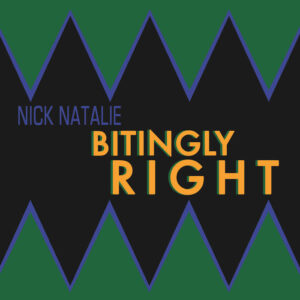Since I first put my hands on a record, I’ve been a fan of liner notes. I used to absorb the detailed descriptions printed on the back of albums, drawing on the passion and detail in order to fuel my own burgeoning excitement. With jazz records, however, the liner notes a re frequently a double-edged sword, couched in a language that is often as oblique in its meaning as the music that resides within, leaving the reader assured only in the fact that the more they discover about jazz, the more they don’t actually know very much at all. So, I write this review firmly in the knowledge that I don’t know very much about jazz beyond the feelings that jazz can elicit.
Hailing from Fairfax, Virginia, Nick Natalie is a saxophonist. Influenced by Jazz, avant-garde and experimental music, his latest record, bitingly right, intriguingly appeared on my doorstep complete with the musical score. This is a first for me, despite having written for SonicAbuse for some years, and it is entirely welcome as it allowed me to see the music in a whole different light and added to the experience greatly.
The album opens with the seemingly simplistic piano motif of hint of content throwing the listener off thanks to an off-kilter 5/4 time signature. Over this, Nick layers 4 saxophone lines, creating a dense wall of melody that is quite unexpected. Such layering on the guitar would earn it a place as a prog-fusion masterpiece, but the saxophone does not appear to have quite such a cachet with the public these days, which is a shame because it sounds fantastic. The piece segues directly into the scattershot saxophone solo that is joyful. Shorn of any accompaniment, you might think the piece would sound empty after the opening cacophony, but not so. Nick’s playing skips lightly around a melody, unsullied by any effects as Ben Green records it straight, allowing Nick’s skills to shine. The short contained at the library sees things head in a Mancini direction, the deft use of high hat, piano and doubled saxophone convincing the listener that far more is happening than there actually is. It’s gone in the blink of an eye and we’re into another solo piece, solitude. The excursions into wider sonic territory are necessary – they keep the record fluid and dynamic – not that Nick, whose playing can be explosive when the situation so calls, needs too much support in this area. With an eye on the Dave Brubeck Quartet (with whose Blue Rondo a la Turk, Solitude would aptly fit) Nick paints detailed portraits with his playing. This evocative sense carries over into the short, slightly eerie We ask the same questions which places crashing piano chords at odds with Nick’s sombre saxophone.
In contrast to the preceding piece, the aptly-titled changing is a fast-paced and whimsical piece of music that darts about unexpectedly in a manner that causes sparks to fly in the ferocious denouement. It is the last conventional piece of the album, signalling the quantum shift that is about to occur, and the remaining four tracks take a joyful detour into Pink Floyd territory as Nick experiments with household objects on the willfully-weird papermetaloutchew. Divided into four movements, the piece starts with paper, the performance notes for which instruct the player to place paper between the reed and the mouthpiece and then crumble it. Metal takes the Floyd comparison one step further as Nick heads into the realm of money, dropping coins into the bell over a slithery sax backdrop. Out sees Nick employing an unusual method of playing his instrument (as if the previous elements weren’t unusual enough) before chew closes out the piece with a “visceral improvisation while chewing reed”. Although taking the Floyd’s long-abandoned Household Objects as its cue, the music itself is closer to Ummagumma‘s solo pieces, veering wildly from melody to mayhem and back again across the course of its sixteen-minute run-time.
Bitingly right is an experience as much as a record. Numerous aspects recall other artists but Nick is clearly more interested in placing his own stamp on proceedings. It’s not an easy task when one considers the seismic advances made in the genre by the likes of Davis and Coltrane but, like Davis, Nick seems to have absorbed and assimilated other elements, refusing to allow his playing to be constrained by form and drawing on the likes of Branca and Floyd along with Prokofiev and Brubeck. The result is an album that challenges the listener. It will soothe, of course, and pieces like joyful are exactly that. However, get too comfortable and the likes of changing will blow your socks off as the album shifts its ground from the certain to the impossibly abstract. An album for those who like to seek beyond the obvious and explore the hinterlands of what genre has to offer, bitingly right is jazz at its most exploratory and is all the more enjoyable for it. 9





Phil, thank you for your kind and thoughtful words!